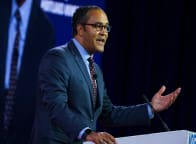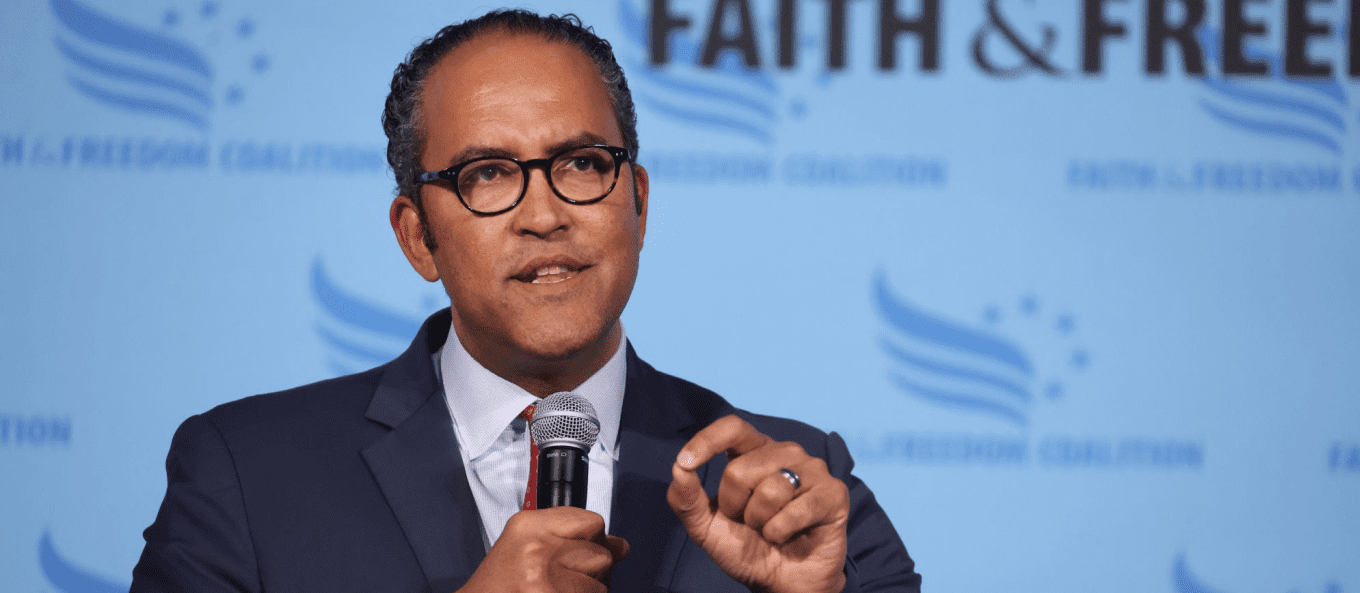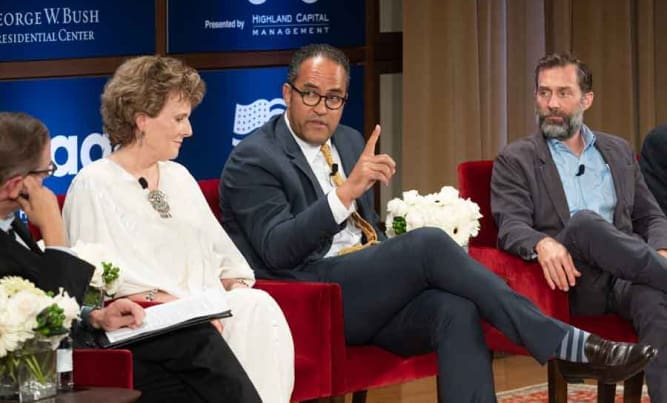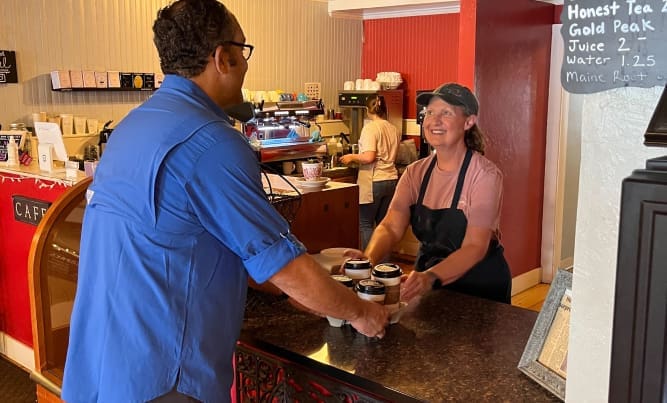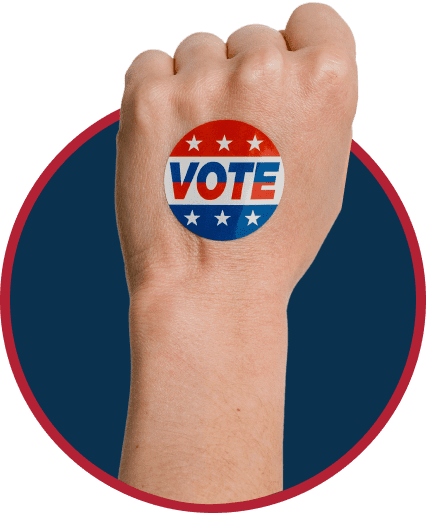Twenty-two years ago, the world came to a standstill as the tragic events of September 11, 2001, unfolded. In New York City, Shanksville, Pennsylvania, and Arlington, Virginia, we witnessed the deaths of 2,977 Americans on that day. Over 6,000 people where injured. The unimaginable loss of life and the unfathomable destruction of the World Trade Center left an indelible mark on history. It’s why we say 9/11 Never Forget.
I expained in an editorial for the Dallas Morning News my feelings the day after America’s worst terrorist attack. I was 11 months into my CIA career. If you would have told me that America would go more than 20 years without another major terrorist attack on our soil, I would have said you were crazy. This analysis grounded itself in the fact that the most devastating act of terrorism on our soil led the intelligence community to assess it would motivate terrorists globally to attempt similar acts.
But that didn’t happen. The work of the men and women in our military, intellligence community, diplomatic corps, and law enforcement organizations prevented it. On September 11th we pay tribute to the nearly 3,000 victims. We honor the heroic acts of bravery displayed during the attacks. We also remember the lessons learned and the unity that lifted a nation in mourning – 9/11, never forget.
The Unforgettable Moments

On that fateful morning, a series of coordinated terrorist attacks by al-Qaeda shook the United States to its core. At 8:46 a.m., after departing Boston, hijackers seized control of American Airlines Flight 11. It crashed into the North Tower of the World Trade Center. This sett off a chain of events that would forever change the course of history.
Less than 20 minutes later, at 9:02 a.m., the following events occurred:
- United Airlines Flight 175, also departing from Boston, collided with the World Trade Center’s South Tower.
- Both towers would eventually collapse, further devastating New York City.
- The attacks resulted in the loss of 2,977 innocent lives.
The horror did not stop there. Hijackers seized American Airlines Flight 77 after its departure from Dulles International Airport and crashed it into the Pentagon at 9:37 a.m. This act killed 125 people inside the building. Hijackers also took over United Airlines Flight 93 after it departed from Newark. Analysts believe they intended to target either the White House or another significant U.S. landmark. However, the courageous passengers on board uttered the call to arms “Let’s roll!” before fighting back. The plane hit a field in Pennsylvania instead, claimed the lives of all 44 people on board.
The chilling events of September 11, 2001, remain etched in our collective memory, serving as a painful reminder of the devastating consequences of terrorism and the resilience of the human spirit in the face of adversity.
A Scared America
The Pew Research Center conducted their first poll on how 9/11 was impacting American psyche and culture. They have continued polling on this topic for twenty-one years. In their first poll and subsequent polling throughout the summer of 2002, they depicted an America that was depressed, scared and fundamentally different:
- In Pew’s first poll they found, “71% of Americans said they felt depressed. Nearly half (49%) had difficulty concentrating and a third said they had trouble sleeping because of the attacks.”
- In polling throughout the fall of 2001, Pew found “Most Americans said they were very (28%) or somewhat (45%) worried about another attack. When asked a year later to describe how their lives changed in a major way, about half of adults said they felt more afraid, more careful, more distrustful or more vulnerable as a result of the attacks.”
- By August of 2002, “half of U.S. adults said the country ‘had changed in a major way’ – a number that actually increased, to 61%, 10 years after the event.”
The Heroes We Will Never Forget
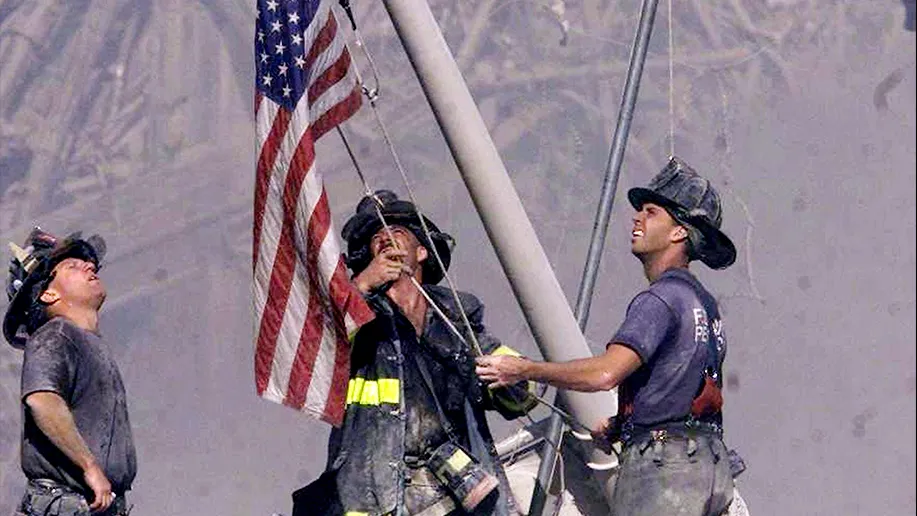
In the midst of chaos and destruction, countless stories of heroism and selflessness emerged. Among the first responders were:
- New York City firefighters
- Police officers
- Paramedics
- Other rescue personnel
They rushed to the scene, risking their lives to save others. Ordinary citizens also displayed extraordinary courage. Some examples include:
- Passengers on United Airlines Flight 93 fought back against the hijackers, preventing the plane from reaching its intended target and ultimately sacrificing their own lives to save countless others on the ground.
- Welles Crowther, a volunteer firefighter and equities trader, who helped save numerous lives at the World Trade Center before losing his own.
- Firefighter Adrienne Walsh, who responded to the World Trade Center with the second wave of first responders, demonstrating bravery and resilience.
These individual acts of bravery have become emblematic of the courage displayed on that tragic day. These selfless acts of heroism serve as poignant reminders that even in the darkest of times, the human spirit can shine bright, instilling hope and inspiring future generations.
President George W. Bush’s Response
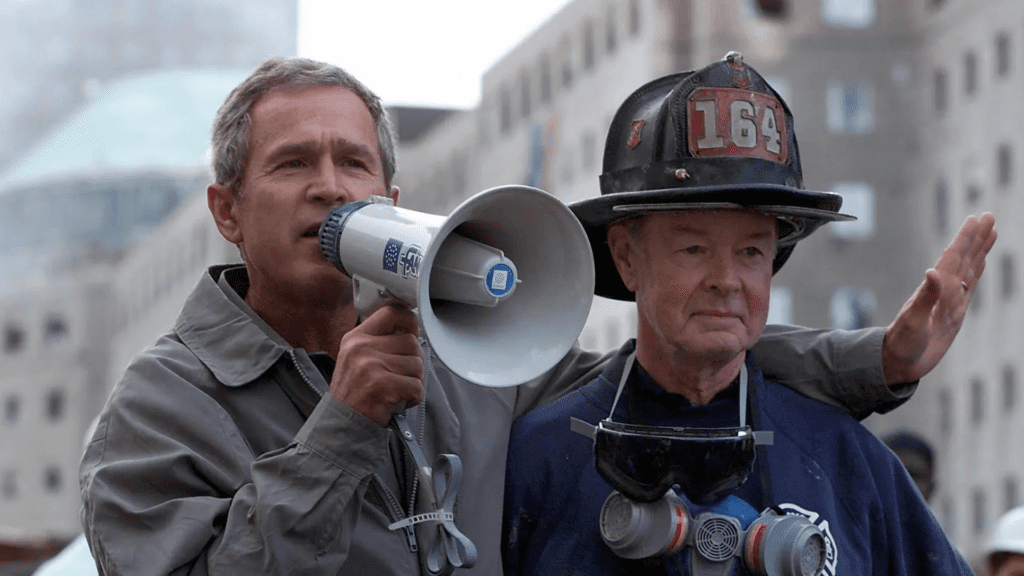
In the aftermath of the attacks, President George W. Bush took charge of the national response and assured the American people that the nation would protect itself against terrorism. He delivered several notable speeches, including his address to the nation on September 11, 2001, and his address to a Joint Session of Congress on September 20, 2001, outlining the nation’s response to the terrorist acts and the subsequent War on Terror. Bush’s response to 9/11 had a significant impact on his presidency, transforming him into a wartime president and increasing his authority in matters of national security. However, his administration’s focus on Iraq and the notion that it was linked to the September 11 attacks generated controversy and criticism.
The World Trade Center: Before and After

Before the attacks, the World Trade Center was a symbol of New York City’s economic power. It served as a hub for global trade and finance. The complex housed over 430 companies and included:
- offices
- restaurants
- a shopping mall
- a hotel
- a transportation hub
The Twin Towers were designed by architects Minoru Yamasaki and Emery Roth & Sons. They stood tall as iconic structures in the Manhattan skyline. The attack on the World Trade Center had devastating economic consequences. It caused immediate damage and disruption to businesses and financial markets. The Institute for the Analysis of Global Security estimates that the cost to the U.S. economy from the loss of life, property damage and economic volatility resulting from 9/11, not including the price tag of the war in Afghanistan, was near $2 trillion.
In the immediate aftermath of the world trade center collapse, efforts to rebuild the site began. The area that was once a symbol of destruction and loss has now transformed into a testament to resilience and hope. Today, the 9/11 Memorial & Museum stands at the site of the former World Trade Center and serves as a physical embodiment of the lessons learned from the tragedy and a place of remembrance, reflection, and education.
The Ongoing Repercussions
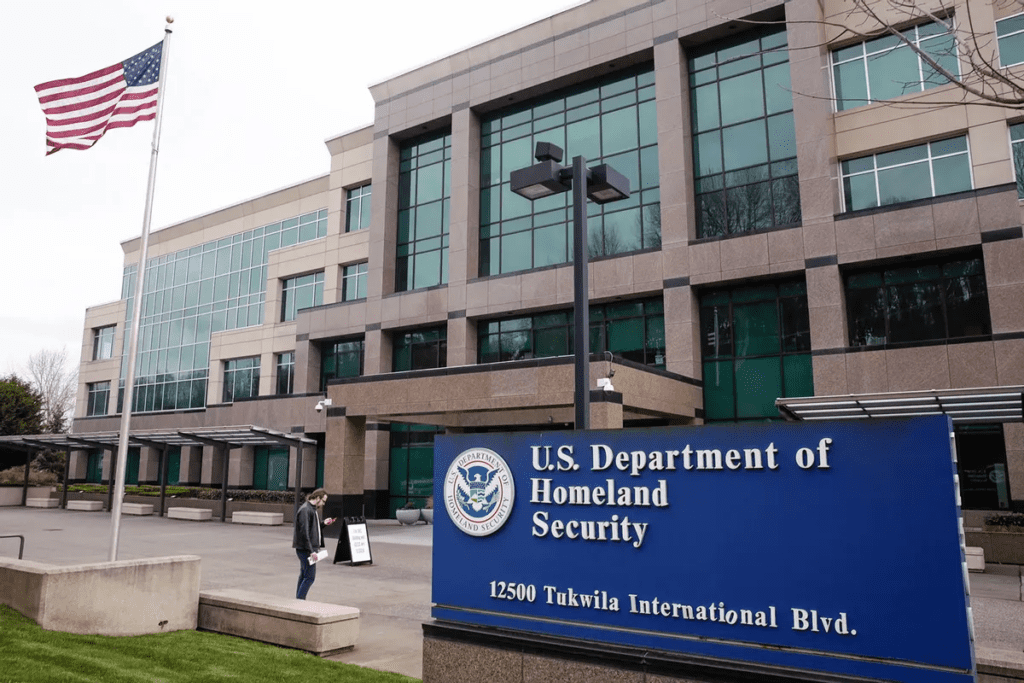
We continue to feel the consequences of 9/11 today. In response to the attacks, authorities implemented the following changes:
- Airlines implemented rigorous security measures to prevent potential infiltration of weapons similar to those used by the hijackers.
- The federal government underwent significant changes, including the establishment of the Department of Homeland Security.
- The intelligence community was consolidated under the Director of National Intelligence.
- The USA Patriot Act and other laws were passed to bolster domestic security and surveillance.
These measures were aimed at enhancing national security and preventing future attacks. Long-term health effects for survivors and first responders also persist. Thousands of individuals are suffering from cancer and chronic health problems due to the toxic conditions at Ground Zero. Moreover, the repercussions of the War on Terror remained palpable in the Middle East. The United States was engaged in military operations in both Afghanistan and Iraq for decades later.
Unity Lifted a Nation in Mourning
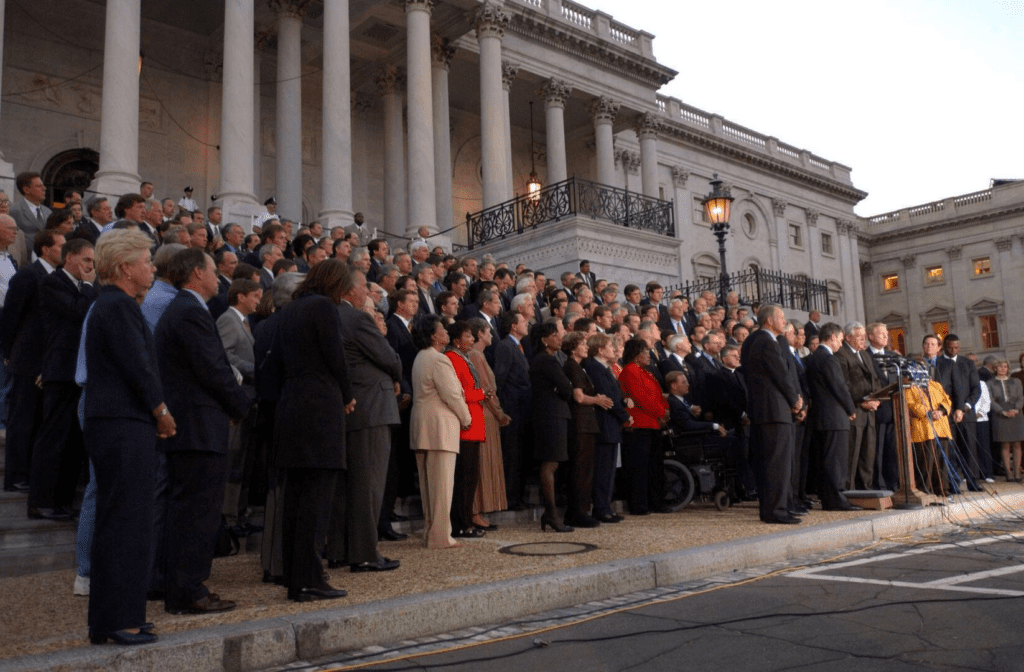
In the wake of the 9/11 attacks, Americans came together in solidarity, patriotism, and unity. They expressed appreciation for rescue and recovery workers, set aside differences, and conveyed a sense of shared purpose and resilience. Communities across the nation demonstrated collective action through volunteer efforts, fundraising and donations, memorials and remembrance ceremonies, interfaith and intercultural initiatives, and support for first responders. Despite being depressed, scared and different (or maybe because of these feelings), in the weeks and months that followed the 9/11 attacks, Pew research found Americans showed a rare spirit of shared public unity:
- News organizations received record-high ratings for professionalism – 69% of Americans said news organizations “stand up for America,” while 60% said the media protected democracy.
- 60% of adults expressed trust in the federal government – a level not reached in the previous three decades, nor approached in the two decades since then.
- 86% of adults – including nearly all Republicans (96%) and a sizable majority of Democrats (78%) – approved of the way George W. Bush was handling his job as president.
Public figures and celebrities also played a significant role in fostering unity after the tragedy. They used their platforms to bring people together, show support for affected communities, and encourage solidarity through benefit concerts, fundraising events, and public statements.
Educating a New Generation
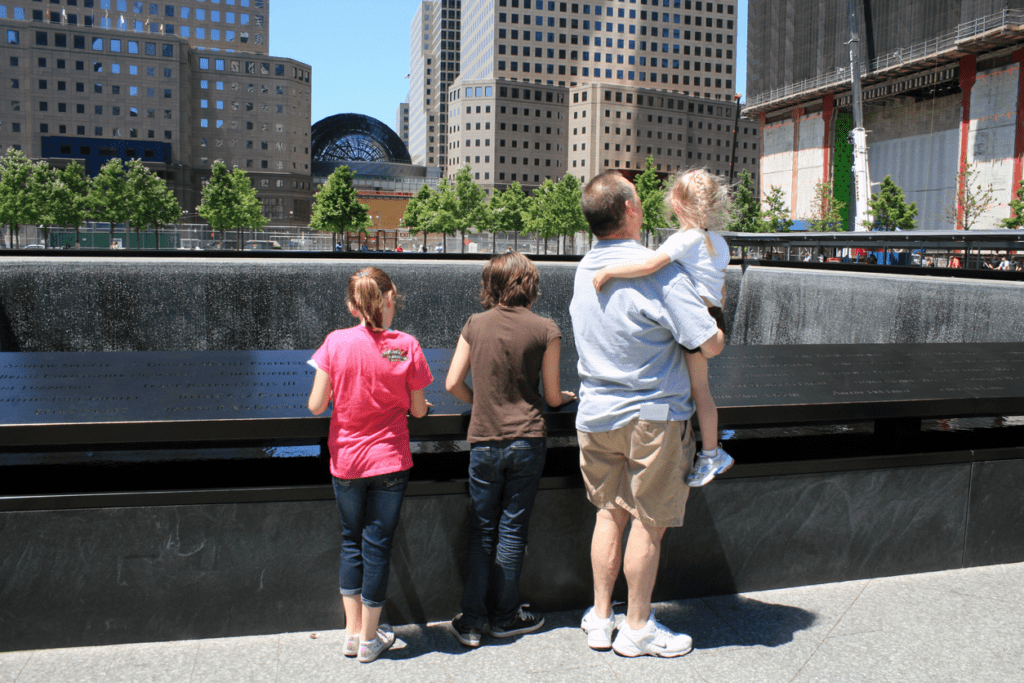
Remembering the events of 9/11 entails educating future generations about the tragedy’s lessons. The 9/11 Memorial & Museum, for instance, offers the Anniversary in the Schools program, featuring a film with first-person accounts of the attacks and their aftermath, and an interactive live chat with Museum staff for worldwide student and teacher engagement. Organizations such as the Never Forget Fund significantly contribute to maintaining the 9/11 Memorial & Museum’s status as a sacred place for remembrance, reflection, and education, through financial support for educational programs.
Honoring the Victims and Their Families
Every year, families of those killed in the 9/11 and 1993 World Trade Center terror attacks come together. They remember and commemorate their loved ones. During the commemoration ceremony, the names of the 2,983 victims are read aloud. Six moments of silence are observed to mark the times of each significant event during the attacks. These efforts are to honor the lives lost and the sacrifices made on that tragic day.
Beyond this annual ceremony, various initiatives and events continue to honor the memory of the victims and provide support for their families. These efforts include memorials, scholarship programs, and community outreach initiatives, ensuring that the legacies of those lost on 9/11 are never forgotten. Reflecting on the somber events of September 11, 2001, obliges us to recall learned lessons, the heroes who emerged, and the unity that held a nation together amidst adversity. Honoring the victims, supporting their families, and educating future generations helps preserve the memory of 9/11 and its enduring global impact.
Bottom-Line
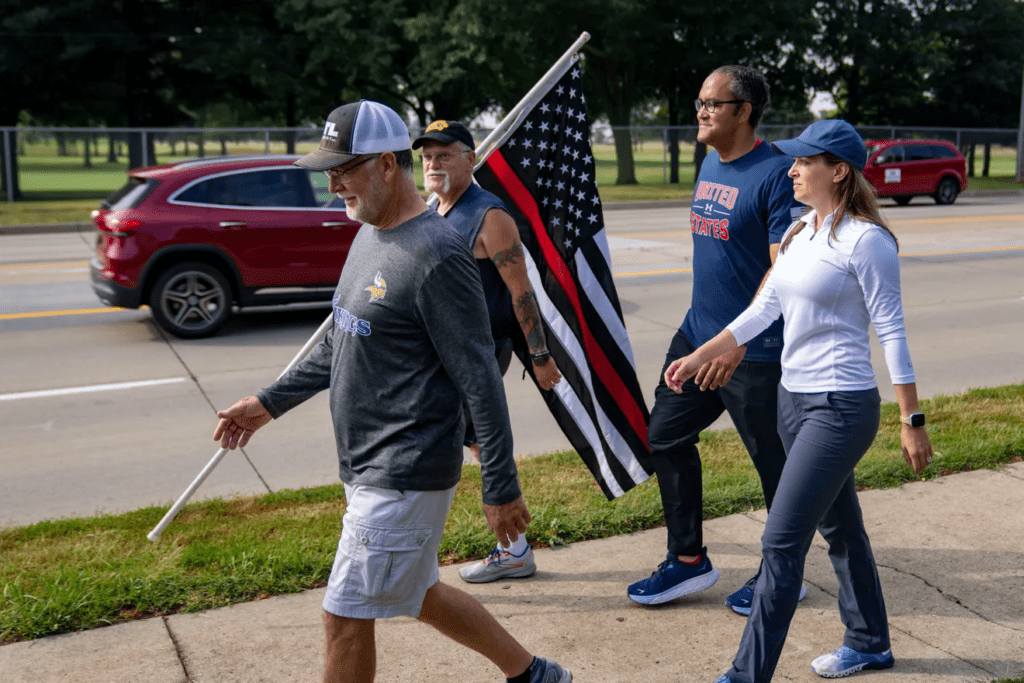
September 11, 2001, forever changed the course of history. It impacted American foreign policy. It left an indelible mark on the hearts and minds of people around the world. The unimaginable loss of life to the unfathomable destruction underscore the need for unity, resilience, and vigilance in the face of adversity. As we pay tribute to the victims, honor the heroes, and remember the lessons learned, we must continue to educate future generations about the ongoing repercussions of 9/11 and the importance of standing together in the face of tragedy. Only by doing so can we truly ensure that the memory of that fateful day remains alive and serves as a powerful reminder of the strength of the human spirit.
Frequently Asked Questions
What is a famous quote about 9/11?
President Bush’s inspiring rallying cry, “I can hear you. The rest of the world hears you. And the people who knocked these buildings down will hear all of us soon.” This remains one of the most famous quotes from 9/11. Former President George W. Bush said that “A great people has been moved to defend a great nation” while former FDNY firefighter Robert Reeg remarked, “It’s the nature of the world that most people have moved on, but the people directly involved with 9/11, for them, twice a day it’s 9/11.” We are also reminded by Bush to fight “not for glory, nor wealth, nor power, but for justice, for freedom, and for peace,” and to honor those we lost through service and kindness.
What does never forget 9/11 mean?
Never Forget is our commitment to the courageous first responders and those on Flight 93 who rushed to save others on 9/11. We honor and remember their actions in service of others.
What do you say in remembrance of 9/11?
On the anniversary of 9/11, we remember those lost and express our continued solidarity by saying, “Never forget,” “always in our hearts,” and “God bless.”
Is September 11 a day of remembrance?
September 11 is Patriot Day and a National Day of Service and Remembrance. We honor the victims and heroes of the tragic 2001 terrorist attacks in the United States. It is an annual day of remembrance and unity.
What were the main targets of the 9/11 attacks?
The 9/11 attacks mainly targeted the World Trade Center towers, the Pentagon, and the White House or U.S. Capit

